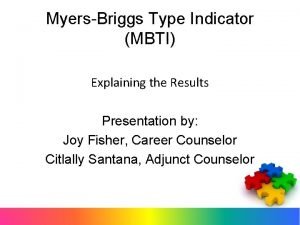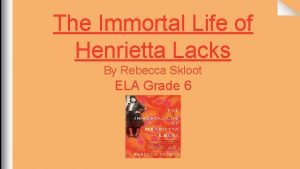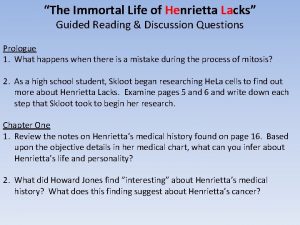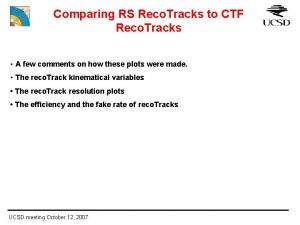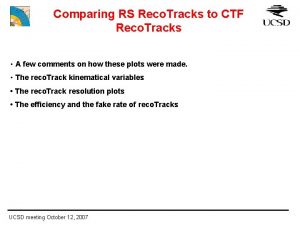IMMORTAL TRACKS OUTSTANDING PEDAGOGUES AND THEIR HERITAGE OUTSTANDING










- Slides: 10

IMMORTAL TRACKS OUTSTANDING PEDAGOGUES AND THEIR HERITAGE

OUTSTANDING PEDAGOGUES Republic of Uzbekistan The Russian Federation 1. Alisher Navoi 1. Jan Amos Comenius 2. Al-Farabi 2. Konstantin Dmitrievich Ushinsky

BIOGRAPHY ALI-SHIR NAVA'I • Ali-Shir Nava'i (9 February 1441 – 3 January 1501), also known as Nizām-al -Din ʿAli-Shir Herawī[ (Chagatai Turkic/Persian: ﻧﻈﺎﻡﺍﻟﺪیﻦ ﻋﻠیﺷیﺮ ﻧﻮﺍیی , was a Turkic poet, writer, politician, linguist, mystic and painter who was the greatest representative of Chagatai literature. • Nava'i believed that Chagatai and other Turkic languages were superior to Persian for literary purposes, an uncommon view at the time and defended this belief in his work titled The Comparison of the Two Languages. He emphasized his belief in the richness, precision and malleability of Turkic vocabulary as opposed to Persian. • Because of his distinguished Chagatai language poetry, Nava'i is considered by many throughout the Turkic-speaking world to be the founder of early Turkic literature. Many places and institutions in Central Asia are named after him.

IMMORTAL TRACKS • Nava'i's best-known poems are found in his four diwans, or poetry collections, which total roughly 50, 000 verses. Each part of the work corresponds to a different period of a person's life: Ø Ghara'ib al-Sighar (Wonders of Childhood) Ø Navadir al-Shabab (Rarities of Youth) Ø Bada'i' al-Wasat (Marvels of Middle Age) Ø Fawa'id al-Kibar (Benefits of Old Age) • Alisher's other important works include the Khamsa (Quintuple), which is composed of five epic poems and is an imitation of Nizami Ganjavi's Khamsa Ø Hayrat-ol-abrar (Wonders of Good People) (( ﺣیﺮﺕ ﺍﻻﺑﺮﺍﺭ Ø Farhad va Shirin (Farhad and Shirin) (( ﻓﺮﻫﺎﺩ ﻭ ﺷیﺮیﻦ Ø Layli va Majnun (Layli and Majnun) (( ﻟیﻠی ﻭ ﻣﺠﻨﻮﻥ Ø Sab'ai Sayyar (Seven Travelers) () ( ﺳﺒﻌﻪ ﺳیﺎﺭ about the seven planets) Ø Sadd-i-Iskandari (Alexander's Wall) () ( ﺳﺪ ﺳکﻨﺪﺭی about Alexander the Great)

BIOGRAPHY AL-FARABI • Abu Nasr Al-Farabi (ælfəˈrɑːbi; Persian: ﺍﺑﻮ ﻧﺼﺮ ﻣﺤﻤﺪ ﺑﻦ ﻣﺤﻤﺪ ﻓﺎﺭﺍﺑی Abū Naṣr Muḥammad ibn Muḥammad al Fārābī; known in the West as Alpharabius; c. 872 – between 14 December, 950 and 12 January, 951) was a renowned early Islamic philosopher and jurist who wrote in the fields of politica philosophy, metaphysics, ethics and logic. He was also a scientist, cosmologist, mathematician and music scholar. • In Islamic philosophical tradition he was often called "the Second Teacher", following Aristotle who was known as "the First Teacher". He is credited with preserving the original Greek texts during the Middle Ages because of his commentaries and treatises, and influencing many prominent philosophers, like Avicenna and Maimonides. Through his works, he became well-known in the West as well as the East.

IMMORTAL TRACKS • Farabi made contributions to the fields of logic, mathematics, music, philosophy, psychology, and education. • Alchemy - Al-Farabi wrote: The Necessity of the Art of the Elixir • Logic - Though he was mainly an Aristotelian logician, he included a number of non-Aristotelian elements in his works. He discussed the topics of future contingents, the number and relation of the categories, the relation between logic and grammar, and non-Aristotelian forms of inference. He is also credited with categorizing logic into two separate groups, the first being "idea" and the second being "proof". • Music - Al-Farabi wrote a book on music titled Kitab al-Musiqa (The Book of Music). In it, he presents philosophical principles about music, its cosmic qualities, and its influences. He also wrote a treatise on the Meanings of the Intellect, which dealt with music therapy and discussed therapeutic effects of music on the soul • Philosophy - As a philosopher, Al-Farabi was a founder of his own school of early Islamic philosophy known as "Farabism" or "Alfarabism", though it was later overshadowed by Avicennism. Al-Farabi's school of philosophy "breaks with the philosophy of Plato and Aristotle [. . . and. . . ] moves from metaphysics to methodology, a move that anticipates modernity", and "at the level of philosophy, Alfarabi unites theory and practice [. . . and] in the sphere of the political he liberates practice from theory". His Neoplatonic theology is also more than just metaphysics as rhetoric. In his attempt to think through the nature of a First Cause, Alfarabi discovers the limits of human knowledge".

BIOGRAPHY JAN AMOS COMENIUS • John Amos Comenius (Czech: Jan Amos Komenský; German: Johann Amos Comenius; Latinized: Ioannes Amos Comenius; 28 March 1592, Moravian Slovakia – 15 November 1670, Amsterdam) was a Czech philosopher, pedagogue and theologian from the Margraviate of Moravia who is considered the father of modern education. He served as the last bishop of the Unity of the Brethren before becoming a religious refugee and one of the earliest champions of universal education, a concept eventually set forth in his book Didactica Magna. As an educator and theologian, he led schools and advised governments across Protestant Europe through the middle of the seventeenth century.

IMMORTAL TRACKS • The Comenius Medal, a UNESCO award honouring outstanding achievements in the fields of education research and innovation, commemorates Comenius. Peter Drucker hailed Comenius as the inventor of textbooks and primers. • Czechia - During the 19 th-century Czech National Revival, Czechs idealised Comenius as a symbol of the Czech nation. This image persists to the present day. Czechia celebrates 28 March, the birthday of Comenius, as Teachers' Day. The University of Jan Amos Komenský was founded in Prague in 2001, offering bachelor's, master's and graduate degree programmes. Gate to Languages, a project of lifelong education, taking place in Czechia from October 2005 to June 2007 and aimed at language education of teachers, was named after his book Janua linguarum reserata (Gate to Languages Unlocked). Comenius is pictured on the 200 Czech koruna banknote. Asteroid 1861 Komenský, discovered by Luboš Kohoutek, is named in his honor. • United States - In 1892 Comenius Hall, the principal classroom and faculty office building on Moravian College's campus in Pennsylvania, was built. In 1892 educators in many places celebrated the threehundredth anniversary of Comenius, and at that time the Comenian Society for the study and publication of his works was formed. [ The education department at Salem College in North Carolina has an annual Comenius Symposium dedicated in his honor; the subjects usually deal with modern issues in education. The Comenius Foundation in the US, a non-profit 501(c)(3) charity, uses film and documentary production to further faith, learning, and love.

BIOGRAPHY KONSTANTIN DMITRIEVICH USHINSKY • Konstantin Dmitrievich Ushinsky (Russian: Константи н Дми триевич Уши нский; Ukrainian: Костянтин Дмитрович Ушинський) (2 March [O. S. 19 February] 1823 – 3 January 1871 [O. S. 22 December]) was a Russian teacher and writer, credited as the founder of scientific pedagogy in Russia. • Konstantin Ushinsky was born in Tula to a family of a retired officer. Soon the family moved to Novhorod-Siverskyi (modern Ukraine) where Konstantin's father was appointed an uyezd judge. In 1844 Ushinsky graduated from the Department of Law of Moscow University. [ From 1846 to 1849 he was a professor at the Demidov Lyceum in Yaroslavl but was forced to leave the position because of his liberal views. The unemployed Ushinsky earned money by literary work for the magazines Sovremennik and Biblioteka dlya Chteniya. After a year and a half he managed to get a position as a minor bureaucrat in the Department for Foreign Religions. Ushinsky referred to his job at the time as "the most boring position possible. " • In 1854 Ushinsky became a teacher of Russian Literature and Law at the Gatchina Orphanage (Gatchinsky Sirotsky Institut). In 1855 -1859 he became the Inspector at the same institution. There was a lucky incident during his inspectorship: he discovered two sealed-off bookcases untouched for more than twenty years, which held the library of Pestalozzi's pupil Hugel. This discovery strongly influenced Ushinsky's interest in theoretical pedagogy.

IMMORTAL TRACKS • Ushinsky's magnum opus was his theoretical work The Human As a Subject of Education: Pedagogical Anthropology in three volumes, started in 1867. According to Ushinsky, the subject of education is human, so it is impossible to achieve results in education without using the results of the "anthropological sciences": philosophy, political economy, history, literature, psychology, anatomy, physiology. [ According to Ushinsky, "Pedagogical experience without science is equivalent to witchcraft in medicine. " Among Ushinsky's breakthroughs was the new "Analytic-Synthetic Phonetic Method" for learning reading and writing, which is still the main method used in Russian schools • Educational institutions named after Konstantin Ushinski: • South Ukrainian National Pedagogical University in Odessa, Ukraine • Yaroslavl State Pedagogical University in Yaroslavl, Russia • 1 st Simferopol Gymnasium in Simferopol, Russia
 Benevolent pedagogues
Benevolent pedagogues Obstructed and unobstructed heritage
Obstructed and unobstructed heritage Sapratibandha
Sapratibandha World heritage is our heritage slogan
World heritage is our heritage slogan Immortal time bias
Immortal time bias The immortal life of henrietta lacks table of contents
The immortal life of henrietta lacks table of contents The immortal borges
The immortal borges Shin kubota jellyfish
Shin kubota jellyfish Scrupulous sin example
Scrupulous sin example The immortal life of henrietta lacks discussion questions
The immortal life of henrietta lacks discussion questions Immortal jellyfish order
Immortal jellyfish order
